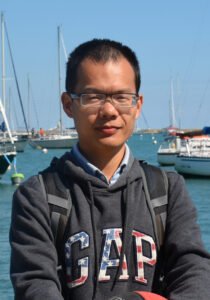Nanotechnology at Northwestern
Meet Fanfan Du, a postdoctoral scholar in the Scott Research Group
April 02, 2021
Fanfan Du is a postdoctoral scholar in the Scott Research Group, which applies principles from biomaterials science, nanotechnology and tissue engineering towards the development of translational immunotherapies.
 Where are you originally from?
Where are you originally from?
I’m originally from Hubei, China.
Where did you complete your undergraduate degree?
I completed my undergraduate degree and PhD at University of Science and Technology of China in Hefei, China.
When did you first become interested in polymer chemistry, and how did that lead you to your current work in biomedical engineering and nanomedicine?
I first became interested in polymer chemistry when starting research in Prof. Ruke Bai’s lab in 2007. At the time, I focused on living radical polymerization and developed various fluorescent nanoparticles, which turned to be very useful as fluorescence sensors and nanocarriers in biomedical engineering and nanomedicine.
How do you explain what you study to non-scientists?
I develop nanocarriers for drug delivery in the Scott Group. These systems allow us to track drug release, enhance loading efficacy, and realize sequence unloading. Overcoming key challenges in advancing polymeric nanoparticle formulations, I study the use of single-component homopolymer self-assembly system for the fabrication of poly(propylene sulfone) (PPSU) nanogels. This kind of hydrogel works like a fishing net, which first spreads out due to electrostatic repulsion and then shrinks upon hydration to trap drugs.
What are you most excited about in your current research?
Nanostructure formation by supramolecular self-assembly primarily involves the hydrophobic/hydrophilic equilibrium of amphiphiles within aqueous environments. The biocompatibility and chemical versatility permitted by block copolymer amphiphiles have allowed the fabrication of a wide range of nanoscale biomaterials. Despite these advances, considerable challenges remain. Self-assembled systems experience substantial difficulties with the encapsulation of molecules, with many (often difficult to express or expensive) proteins and hydrophilic small molecules achieving low encapsulation efficiencies well below 20%.
Furthermore, the multicomponent structure of these amphiphiles often requires employment of complex block copolymer chemistries, which can present difficulties when scaling up synthesis and purification for practical clinical testing and translation. In our current research, we have developed a novel means of supramolecular self-assembly that employs a single, simple, water-soluble homopolymer that achieves >90% encapsulation efficiency universally for multiple hydrophilic (and hydrophobic) small molecules and biologics simultaneously.
What has been a highlight of your time at Northwestern?
Northwestern is a great and beautiful place. I have the opportunity to conduct experiments and characterize synthetic materials following my own interest. I am working with many talented graduate students and postdocs.
What has been the most challenging aspect of your work or your time at Northwestern?
The most challenging aspect of my work has been a change of mind on material development. Being a polymer chemist, I used to focus on chemical and physical properties of polymeric materials. In the Scott Lab, I am developing polymers from an application point of view. This is a big change and I have been balancing basic science and biological applications in my research.
Can you tell me about your experiences either being mentored or mentoring others?
I have learned a lot from both my graduate advisor (Prof. Ruke Bai) and postdoc advisor (Prof. Evan Scott). Prof. Bai is a very rigorous scientist, and Prof. Scott offers me 100% freedom to explore my own research interests. These are very different in terms of expertise and mentorship style. However, both are great for researchers being mentored or mentoring others.
What are your hobbies outside of the lab?
Mostly I enjoy spending quality time with my family – reading books, watching movies, and learning to cook.